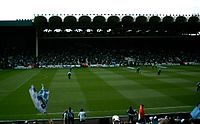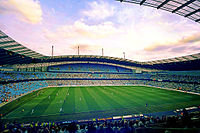2001–present
Maine Road pictured on the day of the last match on 11 May 2003
City moved into the City of Manchester Stadium in August 2003
Main article: History of Manchester City F.C. (2001–present)
After relegation, the club underwent off-the-field upheaval, with new chairman David Bernstein introducing greater fiscal discipline.[23] City were promoted at the first attempt, achieved in dramatic fashion in a play-off against Gillingham.
A second successive promotion saw City return to the top division, but
this proved to have been a step too far for the recovering club, and in
2001 City were relegated once more. Kevin Keegan arrived as the new manager in the close season, bringing an immediate return to the top division as the club won the 2001–02 Division One championship, breaking club records for the number of points gained and goals scored in a season in the process.[24]The 2002–03 season was the last at Maine Road, and included a 3–1 derby victory over rivals Manchester United, ending a run of 13 years without a derby win.[25] City also qualified for European competition for the first time in 25 years after missing out in the 1990s with the European ban on English clubs entering European football. In the 2003 close season the club moved to the new City of Manchester Stadium. The first four seasons at the stadium all resulted in mid-table finishes. Former England manager Sven-Göran Eriksson became the club's first manager from overseas when appointed in 2007.[26] After a bright start performances faded in the second half of the season, and Eriksson was sacked in June 2008.[27] Eriksson was replaced by Mark Hughes two days later on 4 June 2008.[28]
The dream of bringing back the glory era to City, set out by Thaksin Shinawatra just a year before, now seemed doomed,[29] but what was about to unravel was something manager Hughes and the Manchester City supporters could never have possibly imagined, never mind anticipated – as within the coming months Hughes would find himself placed in a financial position which would become the envy of many a football manager and one which would hopefully change the course of Manchester City's inconsistent history for good.
In August 2008, the club was purchased by Abu Dhabi United Group. The takeover was immediately followed by a flurry of bids for high profile players; the club broke the British transfer record by signing Brazilian international Robinho from Real Madrid for £32.5 million.[30] City finished tenth, and also reached the quarter-finals of the UEFA Cup.

Manchester City win the 2011 FA Cup, ending their longest trophy drought in their 131 year history
Prior to the start of the 2010–11 season, Man City completed the transfers of Jérôme Boateng,[33] Yaya Touré,[34] David Silva,[35] Aleksandar Kolarov[36] and Mario Balotelli.[37] James Milner signed during the first week of the season.[38] Edin Džeko joined the club during the January 2011 transfer window.[39] On 16 April 2011, City reached the 2011 FA Cup Final, their first major final in over thirty years, defeating derby rivals Manchester United in the semi-final to set up a meeting with Stoke City.[40] They won the final 1–0, securing their fifth FA Cup (and first since 1969) and their first major trophy since winning the 1976 League Cup. On 10 May 2011, the club qualified for the UEFA Champions League for the first time with a 1–0 Premier League win over Tottenham Hotspur.[41] On the last day of the 2010–11 season, City passed Arsenal for third place in the Premier League, thereby securing qualification directly into the Champions League group stage.
For the 2011–12 season, City made a number of high profile signings, including Gaël Clichy, Stefan Savić, Sergio Agüero, Samir Nasri and Owen Hargreaves. City started the season well, and were five points clear at the top of the Premier League after a 6-1 victory over Manchester United in October. During the January transfer window City signed David Pizarro on loan.








0 komentar:
Posting Komentar